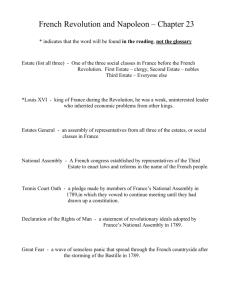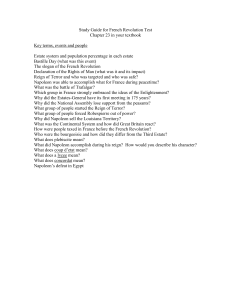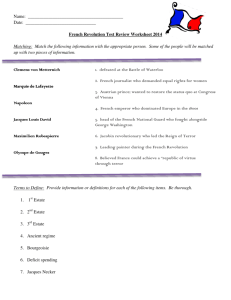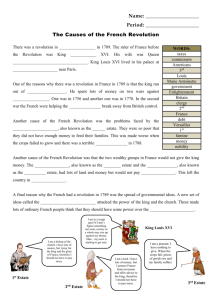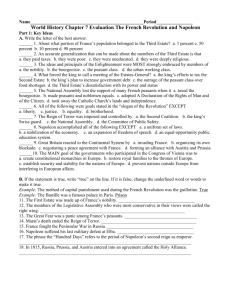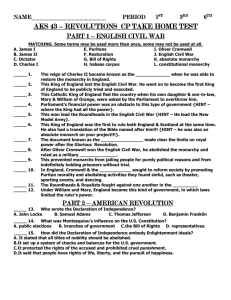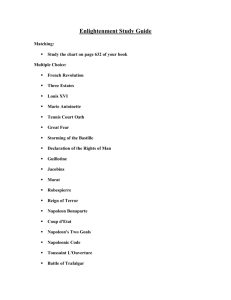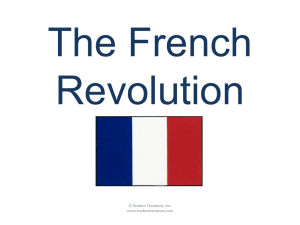Review Sheet
advertisement
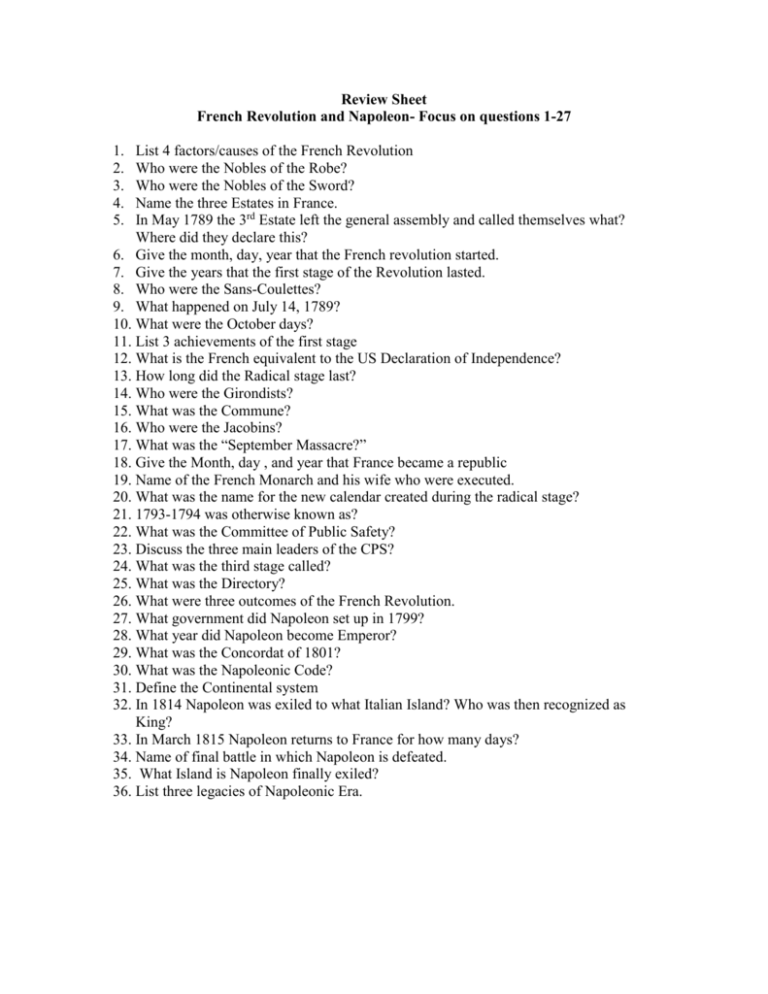
Review Sheet French Revolution and Napoleon- Focus on questions 1-27 1. 2. 3. 4. 5. List 4 factors/causes of the French Revolution Who were the Nobles of the Robe? Who were the Nobles of the Sword? Name the three Estates in France. In May 1789 the 3rd Estate left the general assembly and called themselves what? Where did they declare this? 6. Give the month, day, year that the French revolution started. 7. Give the years that the first stage of the Revolution lasted. 8. Who were the Sans-Coulettes? 9. What happened on July 14, 1789? 10. What were the October days? 11. List 3 achievements of the first stage 12. What is the French equivalent to the US Declaration of Independence? 13. How long did the Radical stage last? 14. Who were the Girondists? 15. What was the Commune? 16. Who were the Jacobins? 17. What was the “September Massacre?” 18. Give the Month, day , and year that France became a republic 19. Name of the French Monarch and his wife who were executed. 20. What was the name for the new calendar created during the radical stage? 21. 1793-1794 was otherwise known as? 22. What was the Committee of Public Safety? 23. Discuss the three main leaders of the CPS? 24. What was the third stage called? 25. What was the Directory? 26. What were three outcomes of the French Revolution. 27. What government did Napoleon set up in 1799? 28. What year did Napoleon become Emperor? 29. What was the Concordat of 1801? 30. What was the Napoleonic Code? 31. Define the Continental system 32. In 1814 Napoleon was exiled to what Italian Island? Who was then recognized as King? 33. In March 1815 Napoleon returns to France for how many days? 34. Name of final battle in which Napoleon is defeated. 35. What Island is Napoleon finally exiled? 36. List three legacies of Napoleonic Era. Review: French Revolution Notes Review of Factors I. Privilege of Absolute Monarchy which was opposed by the French Parlements II. Issues between social classes First Estate Second Estate (nobles of Robe and Sword) Third Estate III. Enlightenment thinking IV. Financial issues V. Personality of Louis the XVI 1789 May-King calls Estate General to deal with Financial issues June 20th(date of Revolution)- Feeling left out, third estate renames itself “National Assembly” and goes to near-by tennis court and claims authority to make up new government. June 27-other two estates joins 3rd and draws up list of grievances to give to King. Review of First State (moderate) 1789-1792. Three events gives National Assembly control. I. Rumor of high prices and scarcity as punishment by the King led the electors of Paris (voters from the 3rd Estate) to form a provisional government and organized a militia (called Sans-Coulettes-did not wear upper class breeches). Storm the Bastille on July 14, 1789. II. Great Fear- revolt in the countryside. Peasants felt left out and began to destroy manor homes and monasteries. III. October Days- women angered at high price of bread and march to Versailles. Achievements of First Stage Review I. Destruction of privilege II. Declaration of the Rights of Man III. Secularization of the church. Lands liquidized for the issue of Assignants IV. Constitution of 1791 V. Economic changes- France divided into 83 departments. Review of Radical Stage 1792-1794. Why radical? I. lower classes become disillusioned II. Lack of effective leadership III. Louis XVI tries to flee Tulleries in Paris to rally foreign support but becomes prisoner of National Assembly. IV. France is at war with Austria and Prussia Events Leaders are called Girondists (merchants) and are against Austria and Prussia to restore French Monarchy. (Declares war on 4/20/92). Military failures are blamed on King. Gen. Lafayette joins the Austrians. August 10- Seize Paris, attack royal palace, replace government with a revolutionary Commune led by the Jacobins. King is imprisoned. September massacres- Paris mobs out of rumor that political prisoners were planning to escape execute them. 9/21/92 France becomes a republic. Louis XVI is executed in January 21,1793. Outcome of Radical Stage I. Domestic reforms II. Military Reforms III. Enforcing Laws- known as the Bloody Terror (1793-1794) Created by the Committee of Public Safety. Headed by 12 Jacobins and Mountains (supported the mob) including: Jean Paul Marat, Georges Jacques Danton, and Maximilien Robespierre. Achievements: stronger federal government, able to defeat coalition of European states. Third Stage “Thermidorian Reaction” (1795-1799) Robespierre faces Guillotine Convention becomes more moderate in time. Priests and Royalist are allowed back in. 1795 Constitution-creation of the Directory March 1797 first free election as a Republic return large group of constitutional monarchs in power. Next two years series of uprisings cause the Directory to look to Napoleon Bonaparte for help. Outcomes- overthrow of old social order, overthrow of Monarchy, church under state control, increased nationalism.

